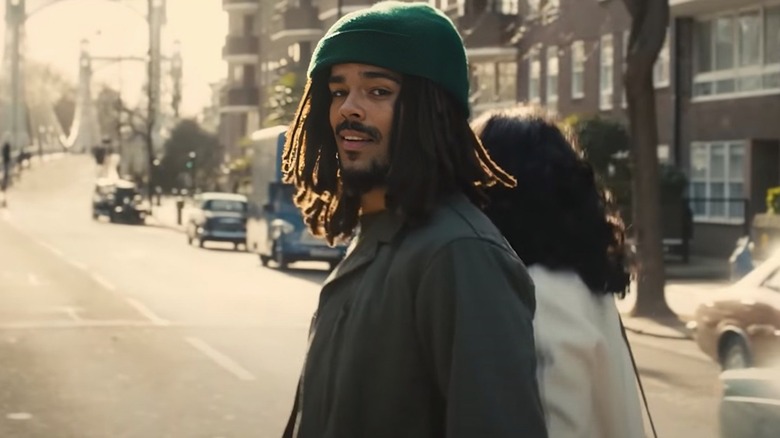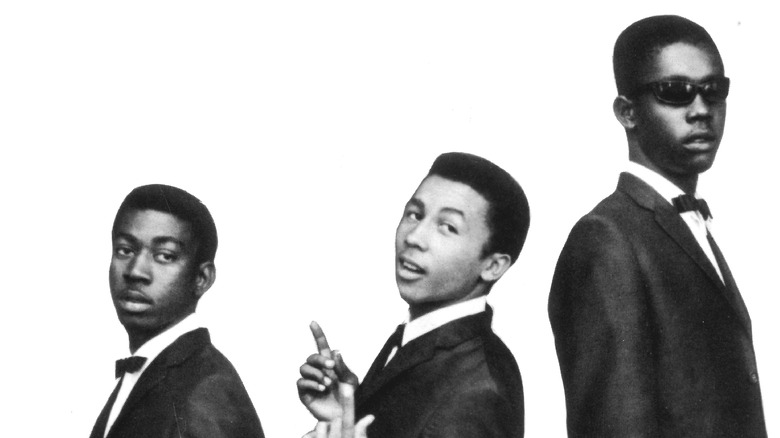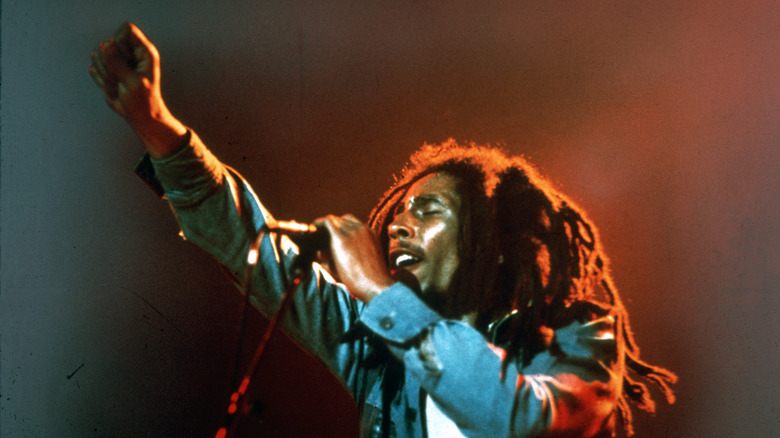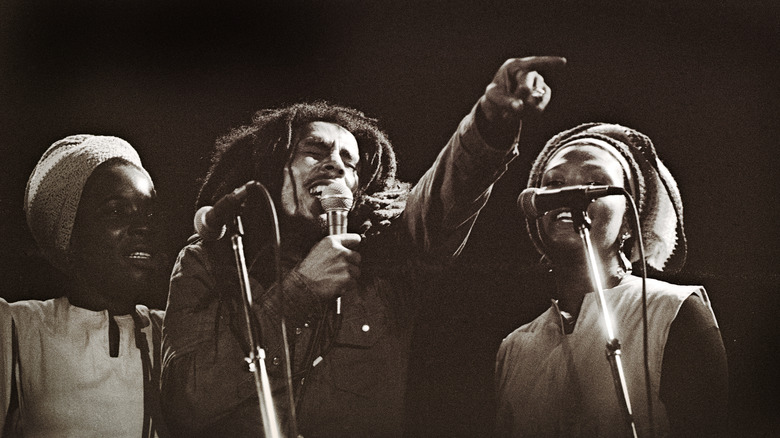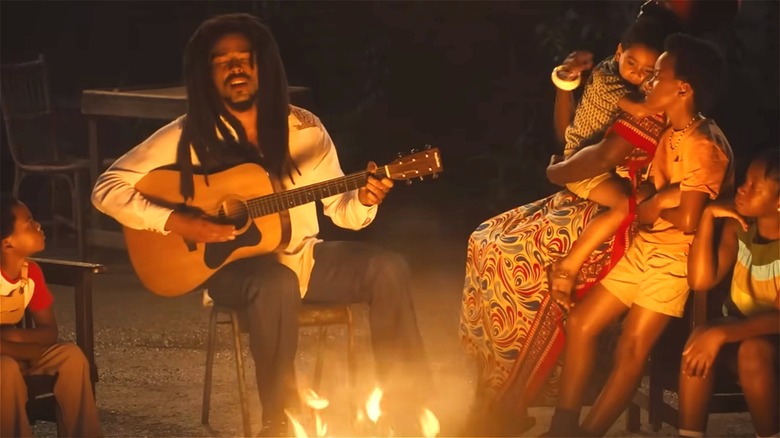Lies The Bob Marley: One Love Movie Told You
Like most biopics of famous musicians, "Bob Marley: One Love," the 2024 film directed by Reinaldo Marcus Green, glosses over some aspects of the reggae superstar's life, cuts out others, and in general plays fast and loose with the facts. When you're trying to shoehorn a complex personality and well-documented life into less than two hours, it's bound to happen.
The film focuses on the time period between the assassination attempt on Marley's life in December 1976 and the following two years he spent in London recording some of his best-loved music (along with several flashbacks to earlier periods in his life). What the movie gets wrong includes his childhood, the very complicated relationship between him and his wife Rita, the details of the Smile Jamaica concert that may have precipitated the attack on the musician, and the circumstances surrounding the cancer that eventually killed the beloved singer at age 36.
Bob Marley's childhood
The singer was born Robert Nesta Marley on February 6, 1945, in the rural town of Nine Mile, Jamaica, the son of Cedella Booker and Norval Marley. "Bob Marley: One Love" doesn't at all touch on Bob Marley's father, who was white and died when his son was just 10. Because Bob was half white, after his mother began a new relationship, she treated him as an outcast, which the film doesn't portray at all.
Booker was living with Thaddeus Livingston, the father of Bunny Wailer, the cofounder of the Wailers — the band that catapulted Marley to international fame. Booker wouldn't tell anyone Bob was her son. "When Bunny and Bob were growing up together, Bob was not treated as one of the family ... One day he was holding tightly to [his mother], and she box him away" Joe Higgs, a musician and mentor to Marley, recalled in "So Much Things to Say: The Oral History of Bob Marley." "He slept beneath the bottom of the house."
The Smile Jamaica concert
The Smile Jamaica Concert held two days after the assassination attempt on Marley at his home in Kingston, Jamaica, appears in the biopic. What had originally begun as a non-political event had become embroiled in the country's heated election. The men who broke into Marley's home and shot him, Rita, and several others, were allegedly affiliated with the U.S.-backed Jamaica Labour Party.
"When me decided ta do dis yere concert two anna 'alf months ago, me was told dere was no politics," Marley told the crowd (via "Catch a Fire: The Life of Bob Marley"). "I jus' wanted ta play fe da love of de people." Marley, still suffering from his bullet wounds, planned to only play one song but instead performed for 90 minutes. The film doesn't give the scope of the event, instead presenting only a few of the songs the band played that night, making it seem as if it were much shorter. This is important because Marley's decision to give an extended show not only showed his commitment to peace but also his defiance in the face of political violence.
Bob and Rita's marriage
Bob Marley and Rita had a complicated marriage, with both of them having extra-marital affairs. While "One Love" touches on this, it doesn't dig into just how complex it really was. They married in 1966 and stayed — but strayed — together until the singer's death. Not only did both Bob and Rita have multiple affairs, but they also had multiple children with others.
Bob Marley had six children with other women during his marriage. "Children are wonderful," he once said (via Punch). "It don't take plenty y'know. Just a nice girl who don't take birth control. Sexual intercourse is a lovely thing." Rita said her husband's infidelity was "a natural thing, Jamaican men have a thing where they want more than one woman" and more than one child. "As they say you grunt and bear it, that's what I had to do because I was so in love with this man and love grew stronger, it's not that it grew weaker," she told BBC Caribbean in 2004. Rita had two daughters by other men during her marriage to Bob.
His music
"Bob Marley: One Love" is centered on the singer's time in London when he and the Wailers recorded the album "Exodus," depicting them working on such hits as "Jamming" and "Exodus." But the film completely cuts out anything linked to Marley's next album "Kaya," which was recorded during the same sessions as the "Exodus" songs. "Kaya," which was released in early 1978, showed a mellower side to the reggae star. "Me too militant," Marley told Melody Maker (via "Bob Marley"). "That's why me did 'Kaya,' to cool off the pace."
Unlike the excising of anything to do with "Kaya" — a sin of omission — the movie went further with Marley's "Redemption Song," which features a made-up scene of the reggae legend singing and playing the tune to his family around a campfire (above). As Slate points out, the timeline doesn't fit. The made-up scene is supposed to take place before Marley ever wrote the song.
Cancer treatment
In "Bob Marley: One Love," the viewer is left with the impression that Marley did nothing to treat the rare skin cancer that eventually ended his life in 1981. This seems to play on a common misbelief that's been floating around for years. While Marley indeed did not want to have his toe amputated for religious reasons and against doctors' recommendations, he did allow a surgeon to try and remove the cancer with excisional surgery, and he sought further treatment. Marley had initially believed he'd suffered a soccer injury on the big toe of his right foot, but doctors diagnosed it as acral lentiginous melanoma.
Doctors removed the nail and toe bed and grafted skin from his thigh over it. Unfortunately, the cancer spread. In September 1980, Marley went to Germany where he underwent alternative cancer treatment and lived another eight months. He planned to return to Jamaica to die but didn't make it. Marley passed away in Miami, Florida on May 11, 1981.
[Image by Enrospr via Wikimedia Commons | Cropped and scaled]
